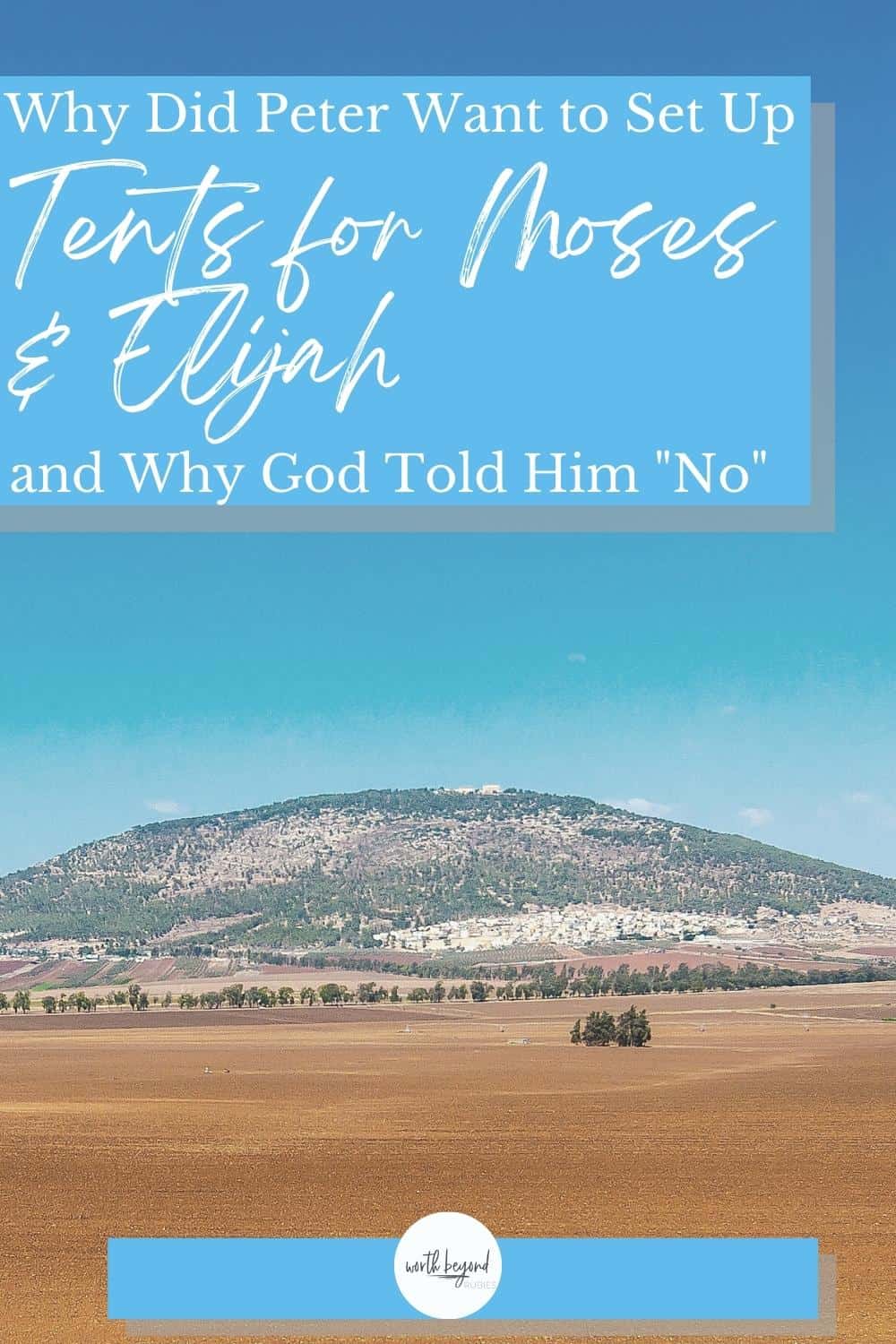Why Did Peter Want to Make Three Tabernacles?(and Why Did God Tell Him “No”?)
Please note that this article may contain affiliate links. As an Amazon Associate, I earn on qualifying purchases at no additional cost to you. You can read more at the bottom of this page or read my full disclosure on my Affiliate Disclosure Page
Why did Peter want to make three tabernacles? Let’s read the verse in scripture and explore this topic further!
And he was transfigured before them, and his face shone like the sun, and his clothes became white as light. And behold, there appeared to them Moses and Elijah, talking with him. And Peter said to Jesus, “Lord, it is good that we are here. If you wish, I will make three tents here, one for you and one for Moses and one for Elijah.” He was still speaking when, behold, a bright cloud overshadowed them, and a voice from the cloud said, “This is my beloved Son, with whom I am well pleased; listen to him.”
Matthew 17:2-5 ESV
I’ve always thought the story of Jesus’ transfiguration is both fascinating and confusing. I imagine what it was like, what James, John, and Peter may have thought, and what it felt like to see the glory of God with their own eyes.
And the next thing we know, poor Peter is in trouble again. I can’t help but face-palm every time I read Peter’s response. I just want to call out to him, “Dude, what are you thinking?! It’s God! Now is not the time to build a campsite! Just stop talking!”
So, I did a little research behind the “tents” Peter wanted to build for the special guests. As always, God’s Word and the rich history of His people uncovered priceless gems. In this post, I’ll show you how Peter’s plan was both relevant and reverent, and how God’s response has great application for us now.

Why Did Peter Want to Make Three Tabernacles? What Peter Really Wanted to Build
Peter didn’t just want to build a campsite to sit and toast marshmallows together. He wasn’t referring to an ordinary tent as we might imagine.
The Greek word translated as “tents” refers to the same type of shelter the Hebrews called sukkah (pronounced ‘sook-kah’).
Strong’s Concordance defines a sukkah as a rude or temporary shelter. They were typically used by cattle, farmers during harvest, vineyard watchers, or warriors in the battlefield.
A sukkah was a small booth or tabernacle made with roofs of willows, palm trees, and other leafy trees (Leviticus 23:40).
Similar to our tents today, sukkot (plural for sukkah) were easy to take down, pack up, and rebuild in a new location, so it was the standard dwelling of the Israelites as they wandered the desert for forty years.
Peter was also familiar with a similar, but more elaborate type of dwelling, the tabernacle of the Lord that traveled the desert along with the Israelites.
Why Did Peter Want to Make Three Tabernacles for Jesus, Moses, and Elijah?
So why a sukkah for each, and why at that moment?
You’d think constructing a little shade would be the last thing on Peter’s mind in the presence of the glory of God.
The answer is in Leviticus, where we learn about Peter’s life experience with Sukkot.
God gave Moses instructions for three Jewish festivals in the Book of Leviticus.
The Festival of Booths is detailed in Leviticus 23:33-44. Every year, the Israelites built sukkot to remember how God alone sustained them through the wilderness during the Exodus.
Peter lived in a sukkah for a week every year during the Festival of Booths, known as Sukkot, as Jews do each year as one of the three Pilgrimage Festivals.
It was a celebration, and a spiritual retreat of sorts, where he learned to go without most conveniences of life to rely on God, just as his ancestors did, and is reminiscent of their years of wandering in the wilderness.
Peter spent the week worshipping in God’s presence, as he was reminded of his reliance on God and of God’s provision.
As the transfigured Jesus, along with Moses and Elijah, the pillars of everything he believed, stood right before him, I imagine Peter thinking I have to do something for them! I can’t just stand here gawking like an idiot!
Peter knew a sukkah was a place to meet with God, so it seemed appropriate and necessary to welcome and accommodate the glory of God as he’d always done.
We know Peter as the passionate, loose-cannon-disciple. While we know he had his moments, by looking at the transfiguration through Peter’s life experience, we can see that he wasn’t impulsive or disrespectful at all.
He was simply trying to worship the best way he knew how.
Why Did Peter Want to Set Up Tents for Moses and Elijah? (and Why Did God Tell Him "No"?) Share on XWhat Does This Mean For Christians Today?
There are only three recorded instances of people hearing God’s audible voice in the New Testament*, and one of them was God speaking directly to Peter to tell him to listen to Jesus.
Jesus came as our intercessor, so God didn’t need a tabernacle to speak to His people anymore. Instead, we’re to listen to Jesus.
Many Jews continue to observe the Festival of Booths today as a beautiful reminder of our dependence on God and to be grateful for His provision.
It’s an opportunity to focus on what He’s done and who He is, but we don’t have to be Jewish or wait for the Festival of Booths to meet with our Heavenly Father.
Peter met God in a tent, but today the Holy Spirit lives in our hearts as we look forward to our forever-home with Him in heaven.
- *The other two were after Jesus was baptized in Matthew 3:17, and as Jesus predicted His death in John 12:28
- https://www.blueletterbible.org/lexicon/h4908/
- https://www.blueletterbible.org/lexicon/h5521/
- https://www.blueletterbible.org/lexicon/g4633/

Valerie Riese
Valerie is an author, blogger, copyeditor, and proofreader. She suffered years of debilitating anxiety brought on by infertility, brain disease, and breast cancer, until she learned that victory over anxiety comes only through surrender to Jesus. Now she writes to point women to Jesus as co-director of Candidly Christian. You can learn more about Valerie at ValerieRiese.com. Valerie lives in Wisconsin with her husband and teenage daughter.
ESV – “Scripture quotations are from The ESV® Bible (The Holy Bible, English Standard Version®), copyright © 2001 by Crossway, a publishing ministry of Good News Publishers. Used by permission. All rights reserved.”

Excellent. I always wondered about the tents too. This makes sense. Thank you.
Janis
Thanks, Janis! I’m glad you learned something, too. (And that I wasn’t the only one who didn’t get it!)
Thank You Sister for such an important insight
It’s more Powerful than any theological point of view
I love you with the Love of God
May you be blessed
Apostle Shimon
India
Thank you! Yes Valerie did an amazing job sharing in this article!
Blessed through the insight in God’s Word.
I am so glad it encouraged you!
Thank you for this. Many things I read that regurgitate what’s already there or nonsensical things; this is rational and helpful (not mind blowing or outrageous, but helpful). Thank you.
Thank you for your comment Andy! She did a wonderful job on this post!